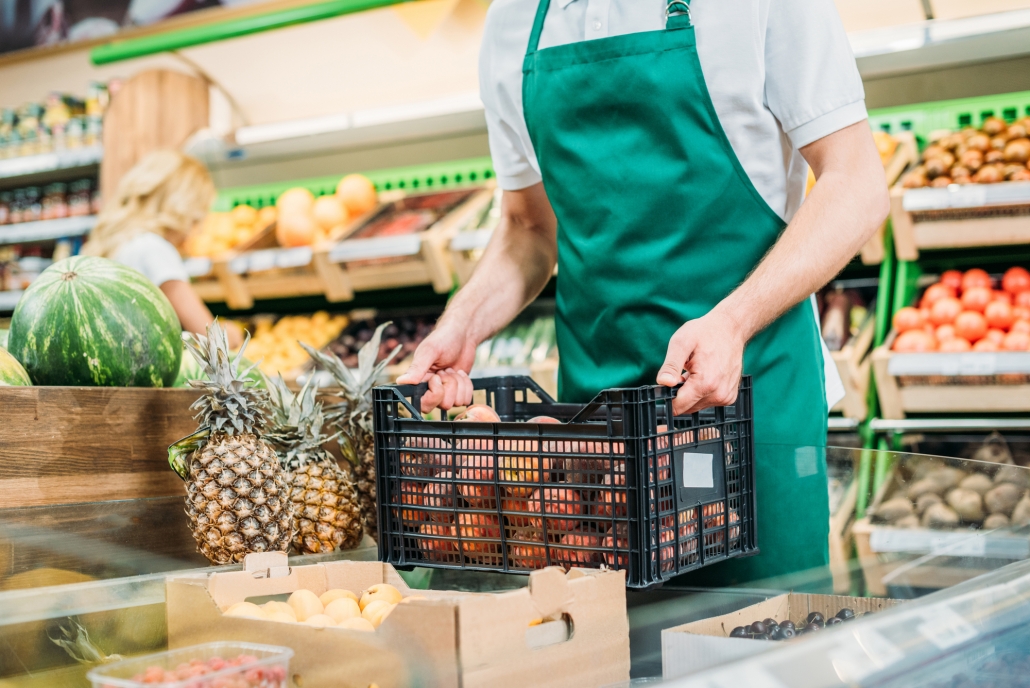Procedures & Attire for At-Risk Service Industries During COVID-19

In the face of the coronavirus pandemic, news reports remind us daily of workers struggling within the healthcare system, under-supplied and under-staffed. But what about those who too often go unnoticed? The grocery stockers who are shoved aside by customers desperate for toilet paper, the restaurant servers who carry food curbside to waiting cars so their customers can remain safe, the nursing home care-providers who continue to take watch our vulnerable elderly citizens often without the supplies carried by hospitals.
We would like to recognize those quiet heroes, the ones who continue to go to work during this difficult time of crisis and put themselves at risk so that others receive the things they need. We at Aprons and Smocks will stand by at-risk service industries by continuing to provide our smocks, coats, and aprons so that you can stock up for the protection of your employees.
We also want those employees to keep themselves healthy and safe as they provide services. We, therefore, offer these safety considerations for protecting service employees and the public they serve during the coronavirus outbreak.
Restaurant Workers
Because restaurants have transitioned to pick up and delivery only, much of what service workers need to keep in mind has to do with the point of contact. Your aim should be to create contactless delivery of food and exchange of money.
Many restaurants have set up systems by which customers park outside the venue and employees bring food outside to minimize contact in the contained airspace of the restaurant, or they have blocked off small sections of the restaurant space for pick up. Encourage customers to wait in cars and take advantage of cell phones to contact them when their order is ready.
Technology can also be used for alternative means of payment so that cash doesn’t change hands. If you must handle cash, assign one employee to do so and consider placing it in a container where it can be sprayed with disinfectant. Certainly avoid methods that require pen signature.
Good hygiene measures, of course, apply and employees should wash hands frequently with soap and water for at least 20 seconds, particularly before contacting food or packaging and after coming into contact with customers or cash. At the end of a shift, place your apron in a designated space for cleaning. It is a good idea to have several clean changes of apron on hand. Delivery workers should keep vehicles clean and take the time each day to wipe down interior spaces with disinfecting agents.
Maintaining a six foot distance between coworkers or customers is key to staying healthy. Some restaurants have gone as far as placing Xs on the floor to indicate safe spacing for waiting customers.
Nursing Home Caretakers
As the service providers, for the most at-risk members of our community during the coronavirus crisis, we urge you to take strict measures to keep yourself and them safe. Each day, you should take your temperature. Anything 100 degrees and over should be a concern, and you should remain at home. You should also monitor coworkers and patients around you for signs of COVID-19, such as cough or shortness of breath. Should someone around you show signs, immediately put them in a face mask to prevent spread.
Keep areas well supplied with the proper supplies, including gloves, masks, and smocks, if available. Some units in short supply of these items have designated their use for dealing with the ill or for performing tasks where exposure to aerosol spray (sneezing and coughing) is likely.
Plenty of soap, towels, and hand sanitizer should be available so that workers can sterilize before and after any interaction with a patient. Hands-free disposal containers should also be placed at the doorway of each room where workers come into contact with patients.
Limit visitors to the absolutely essential, such as end of life scenarios, and be sure that visitors follow hand washing procedures before and after visitations. Community visitation areas and eating spaces should be closed.
Finally, keep hospital grade disinfectants in supply and frequently wipe down surfaces with them. It is advisable to also make this a routine part of any end of shift duties.
Grocery Employees
Grocery workers may have the most difficult time avoiding contact with customers, as those desperate for goods in short supply become aggressive. As much as possible maintain distance from members of the public. If you are stocking shelves, place a cart between you and the customers or if possible cordon off the aisle until restocking is complete.
To reduce the risk of virus transmission, some grocers have installed sneeze shields at checkout lines, and all workers should wash their hands thoroughly with soap and water before touching grocery items or when coming into contact with customers or cash. It’s a good idea to keep hand sanitizer at every register both for workers and patrons, and to use disinfectant on belts or platforms between each transaction.
If you are responsible for cleaning your own smocks and aprons, keep a disposable bag on hand in which you can store your dirties after your shift and immediately place them in the wash once home. Keep an extra smock on hand in case you can’t get to the wash before your next shift.
Your Safety Is Our First Concern
The work you’re doing is starting to be recognized! Minnesota and Vermont, for example, have classified grocery store employees as emergency workers allowing them the benefits of healthcare providers and first responders. We, too, want you to know we’re thinking of you and appreciate your efforts.
Aprons & Smocks is fully prepared to service at-risk industries that need to stock up on aprons, coats, or smocks for their employees. View our grocery store aprons, pharmacist lab coats, and nursing home aprons.





